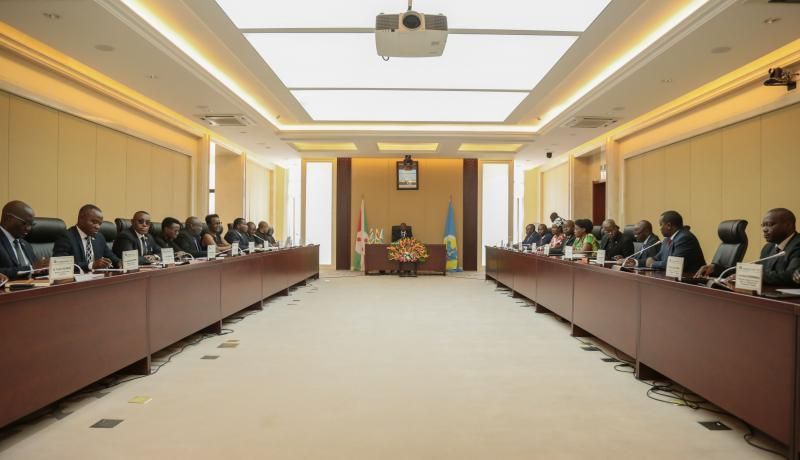
The untimely death of former president Pierre Nkurunziza closes a major chapter in Burundi’s history stretching back to the end of the twelve-year civil war in 2005. Burundi’s overweening Tutsi-dominated military had proved unable to defeat an insurgency with deep roots in the marginalised, mostly Hutu rural population, and a long, painful stalemate had ended with ethnic quotas for the national assembly, senate and – vitally – the military enshrined in a new constitution. The post-war settlement was heralded - at the time - as a model for peaceful post-conflict power-sharing.
Nkurunziza, as leader of the largest faction of the principal rebel group, the CNDD, was able to win a comfortable victory in the 2005 elections. Despite entrenched ethnic grievances going back generations, there was no backlash from the outgoing Tutsi military elite. Nkurunziza’s government was free to pursue policies such as free primary education and maternal healthcare - of clear benefit to the deeply impoverished rural poor who were the bedrock of CNDD support and recruitment during the war.
Nkurunziza’s leadership also saw Burundi play a more positive regional role, sending significant numbers of troops to the African Union (AU) peacekeeping force in Somalia. And an estimated 500,000 Burundian refugees in Tanzania returned home, some having been in exile for more than 30 years.
Hutu fighting Hutu
But this early promise waned swiftly as violence continued, albeit not following the old pattern of Hutu against Tutsi. Instead, clandestine score-settling between the new CNDD government and former rebel groups excluded from post-war power largely saw Hutu fighting Hutu.
The result was widespread human rights abuses and extrajudicial killings, strongly criticised by human rights organisations, many of which were subsequently forced to close down. Allegations of corruption grew against CNDD-appointed civil servants, and an unaccountable and brutal security state saw the erosion of civil liberties and ultimately the closing down of democratic space.
After Nkurunziza announced his intention to stand for a third five-year term in 2015, the long-anticipated reaction from the remaining elements of Burundi’s military still outside CNDD control saw General Godefroid Niyombare leading a coup attempt that only failed after significant fighting in the capital Bujumbura.
This led to a sharp deterioration in external relations, most notably with neighbouring Rwanda being accused of backing the coup which started an effective state of cold war between the two that has persisted ever since. CNDD cadres became ever more inward-looking, cracking down still further on perceived sources of internal threat, shutting down independent media and driving much of Burundi’s remaining civil society and urban middle class into exile.
Relations with donors and multilateral institutions collapsed, and even Burundi’s role in The African Union Mission in Somalia (AMISOM) which had gained it so much international goodwill was repeatedly threatened. Amid all the chaos, Nkurunziza remained largely aloof – by now a remote and devout character more interested in travelling among rural communities, planting crops, playing football, and praying.
Powerful, but not all-powerful
However, the reality had always been that Nkurunziza was powerful but not all-powerful. He was heavily constrained by factions within the CNDD and the sprawling, opaque security state it presided over.
The CNDD was founded in 1994, with Nkurunziza only emerging as a pivotal figure after a split in 2001. Even then, he was seen as a compromise candidate under the patronage of CNDD heavyweight Hussein Radjabu who remained as party chairman until he was deposed and arrested in 2007.
Although extremely popular among the CNDD’s rural grassroots, Nkurunziza never dominated the CNDD or indeed the country in the way that leaders of other insurgencies-turned-ruling parties have done in Burundi’s near neighbours. While many expected an attempt by Nkurunziza to seek to extend his time in office once again in the 2020 election, it was not hugely surprising he stood down beforehand.
He was being positioned to move to a role as a symbolic and moral figurehead – the country’s ‘supreme guide to patriotism’ – which would allow former soldier and CNDD secretary general Evariste Ndayishimiye to slide seamlessly into the presidency. Despite some resistance from rival factions in the CNDD, Ndayishimiye’s succession was agreed and he won the election in May with more than 70% of the vote.
The fact that power had already transferred to Ndayishimiye means there is not likely to be immediate unrest in the aftermath of Nkurunziza’s untimely death. And it may also allow the new president to chart a different path, free from the looming threat of his predecessor.
Although it is yet to be seen how far Ndayishimiye is willing, or able, to control the CNDD’s factions and discipline Burundi’s security state – notably powerful generals and the feared party youth militia the Imbonerakure, which he once headed – he may have an opportunity to end the slow post-war spiral into insularity and paranoia, to reset relations with neighbours and partners, and to have the courage to allow oxygen back into its suffocated politics and civil society. Though significantly weakened, the foundations laid by Burundi’s post-war settlement have not yet eroded entirely.
Ben Shepherd, Consulting Fellow, Africa Programme.
